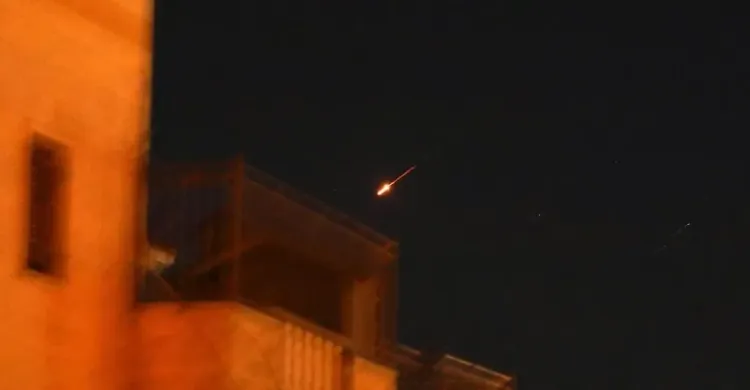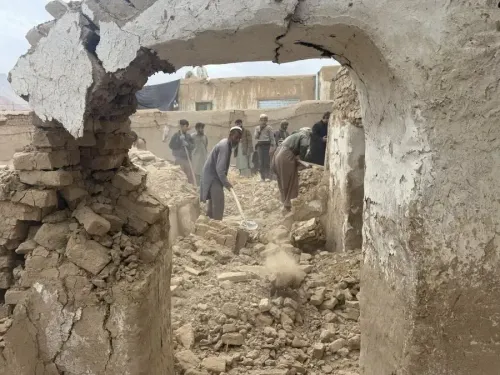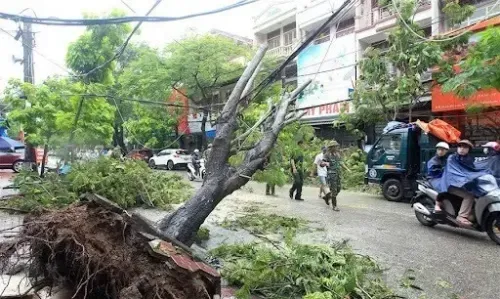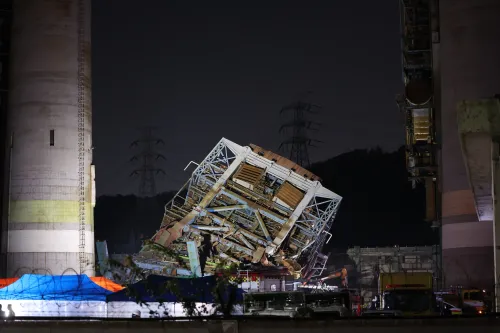Did the Israeli military intercept a missile from Yemen?

Synopsis
Key Takeaways
- Israeli military intercepts missile from Yemen.
- Magen David Adom reports no injuries.
- Missile launch follows extensive Israeli airstrikes.
- Houthi group vows to continue attacks until blockade is lifted.
- International condemnation of Israeli strikes from Iran.
Jerusalem, July 10 (NationPress) - The Israeli military announced that it successfully intercepted a missile fired from Yemen towards Israel in the early hours of Thursday, following the activation of air raid sirens across multiple locations, including Tel Aviv.
Israel's Magen David Adom ambulance service confirmed that there were no reports of injuries from this incident.
No immediate statements were provided by the Houthi forces.
This missile launch occurred shortly after extensive Israeli airstrikes on Sunday that targeted Houthi-controlled locations, which included three Red Sea ports, a power facility, and a ship.
In recent months, Israel has executed numerous attacks on vital ports and infrastructure in Yemen as the Houthis persist in launching missiles towards Israel, claiming these operations are an expression of solidarity with the Palestinians in Gaza, as reported by the Xinhua news agency.
On July 7, the Houthi group had previously launched hypersonic ballistic missiles and drones aimed at Israeli targets just before dawn, occurring four hours after Israeli military aircraft and naval vessels targeted three Red Sea ports and a power station on Sunday night.
Yahya Sarea, a spokesperson for the Houthi military, stated during a broadcast on Houthi-operated al-Masirah TV that the group had launched eleven missiles and drones, with specific targets including Ben Gurion Airport, Ashdod Port, a power station in Ashkelon, and eight drones directed at Eilat Port.
Sarea claimed that the missiles and drones successfully hit their intended targets and that the interception systems had failed to engage them.
The Houthi spokesperson emphasized that the group is "fully prepared for a prolonged confrontation," reiterating that their assaults on Israel will persist until the "war on Gaza halts and the blockade is lifted."
The Israeli Defense Forces (IDF) reported that the Houthis had launched two missiles towards Israel on Monday, which triggered sirens in Jerusalem, the Judean Desert, the Dead Sea region, and various settlements in the occupied West Bank.
Magen David Adom emergency service stated that there were no injuries reported.
"Efforts were made to intercept the missiles, and the outcomes of the interception are under evaluation," stated the Israeli military.
This retaliatory strike occurred shortly after Israeli fighter jets targeted Houthi-controlled sites in Yemen, including the ports of Hodeidah, Ras Isa, and As Salif, as well as the Ras Qantib power station.
The strikes also aimed at the Galaxy Leader Vessel, which the Houthis seized in November 2023. The IDF accused the Houthis of installing radar on the vessel to monitor maritime activity in the Red Sea and claimed that the Houthis utilized the three civilian ports for smuggling Iranian missiles and drones targeted at Israel.
Both Iran and the Houthis have consistently denied these allegations.
According to the IDF, around 20 jets deployed over 50 bombs and missiles during the operation.
On the same day, Iranian Foreign Ministry spokesman Esmaeil Baghaei condemned Israel's attacks on Yemen, labeling them as "flagrant crimes" against the Yemeni populace and the nation’s economic and public infrastructure.









